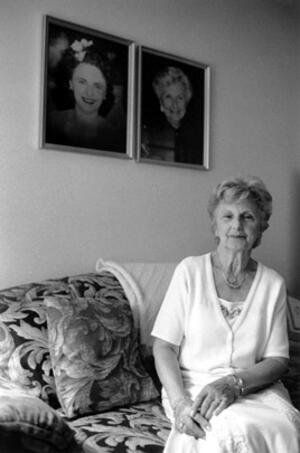Ventura Franco Israel
A native of Seattle, Ventura Israel was born in 1915, two years after her parents immigrated from Turkey. Forged as a strong woman by the deaths of men in her family-her father’s in 1928, her first husband’s in 1970, and her second husband’s in 1989-she helped support her family during the Depression, and as a twenty-five year employee of Union Federal Savings and Loan. Both her first husband, Maurice Franco, and her second husband, Morris Israel, were born in Rhodes, Greece, and Ventura spent her religious life in Seattle’s Sephardic community. The mother of two, and a vibrant community member, Ventura currently volunteers at the Caroline Kline Galland home and at her synagogue, Congregation Ezra Bessaroth.
Ventura describes her family’s background, the neighborhood where she grew up, and the circumstances and impact of her brother and father’s death. Ventura talks about the financial hardship brought on by the loss of her father and having to work to support the family. She is grateful to the Jewish Welfare Society for the services it provided to Ventura’s family. Ventura remembers her education growing up, attending Ahavath Ahim synagogue with her family, and her parent's expectation that she marry a Jew. She recalls her courtship to Maurice Franco, the Sephardic customs for engagement and marriage, and their early married life in Los Angeles, where they started a family. She shares her thoughts on parenting, gender roles within marriage, and the holidays and customs they practiced as a family. Ventura and Maurice returned to Seattle and opened a florist shop on Broadway. Ventura went back to work after the birth of her children, helping out at Franco’s Florist and working at Union Federal Savings. Ventura also discusses the geographical history of the Jewish community, the importance of religious values, and her attitudes toward religious intermarriage. Other topics of interest include: the Seattle Sephardic community; Ventura's family dealing with poverty after the death of her father, including assistance from the Jewish Welfare Society; her brother who could not speak and his lifelong residency at a "home" at Medical Lake, Washington; Sephardic food and customs; and descriptions of family heirlooms and other saved artifacts, such as letters from WWII servicemen the family hosted for Passover.



